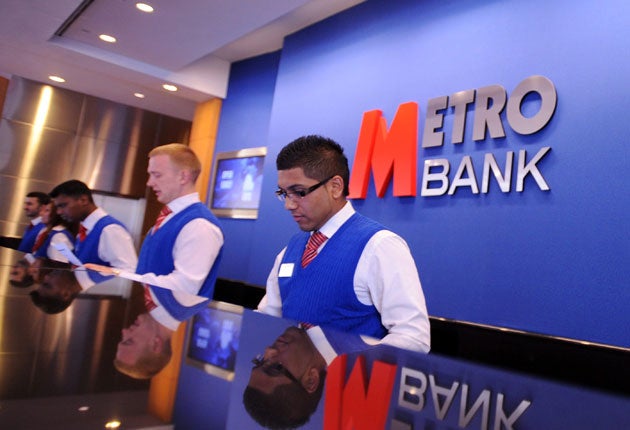Slow dawn of a new banking era
As some banks focus more on customer service than best buys, others are contemplating the end of free current accounts

Banking in the UK has seen a big shake-up this month with Barclays appointing a controversial new boss, Metro unveiling a new branch and Sainsbury's launching a revolutionary new credit card. Do these moves mean it's time customers considered moving their business?
Investment banker Bob Diamond, a man once described by Lord Mandelson as the "unacceptable face of banking", is set to enjoy a £1.35m salary and impressive bonuses as Barclays' new chief executive. The appointment has sparked concerns from Westminster that banks are still determined to mix traditional banking with higher risk investment arms, dubbed "casino banking".
"It will be interesting to see how he perceives the retail banking side," says Darren Cook from financial comparison site Moneyfacts.co.uk. "There might be a bit more innovation, good or bad, and he could challenge the norms of current retail banking. Hopefully this will be to the benefit of the customer."
For Barclays' customers worried about banks mingling their retail arms with more volatile investments, this move could increase anxiety that their deposits are at risk. Customers may well decide that the risk profile can only go up with Mr Diamond as boss, persuading them to look elsewhere and take their deposits with them. That could benefit the likes of Metro Bank which launched a new branch in London's Earl Court last week, promising consumers it will focus on better service rather than best buys. The bank also plans to bring forward the opening of stores in Borehamwood, Hertfordshire and Fulham Broadway in west London.
"There is a real appetite among consumers for a better banking experience," says Craig Donaldson, chief executive officer at Metro. "This proves that customers are looking for true value – and we offer that value through services such as extended opening hours, free coin counting, and on-the-spot bank cards and chequebooks, equating to great value on the high street."
Even dogs are welcomed into branches with water bowls and biscuits, but time will tell if consumers decide that a better service is worth the sacrifice of receiving the best rates. Although customer service is important to many people, interest rates and fees are always going to attract attention. The Halifax Reward current account, for example, pays £5 for every month that you pay in at least £1,000. You can also earn £100 if you pay in the same amount and switch to the Santander current account, and earn 5 per cent for 12 months on the first £2,500 of your balance.
"There are also the likes of Tesco, Virgin and the Post Office waiting in the wings to launch expanded product ranges – especially current accounts – and I expect that they will be much more of a threat to the established banks than the likes of Metro," says David Black, the head of banking at analysts Defaqto.
Other notable moves in the banking world include the predicted end of free banking. At the moment, free current accounts are often used as a loss leader, giving banks the opportunity to sell other services. But with the number of paid-for current accounts up 94 per cent over the past four years, according to Defaqto, we may all be paying for our current accounts in the not too distant future. This isn't necessarily a bad thing either – if we're handing over cash for a service, banks will little choice but to up their game.
"If free banking does disappear, I don't think banks will get away with their current service levels. You would expect that when you part with your money for a service, the added value in return needs to be measurable and exceed expectations," says Mr Cook.
We may even see this model moved across to other financial products with Sainsbury's new gold credit card testing the water. The card launched last week costs £5 a month but comes with a range of attractive benefits such as family travel insurance and double Nectar points on Sainsbury's shopping. Crucially, there are no foreign exchange transaction fees and interest-free cash withdrawals to customers clearing their balance in full and on time each month, as well as a low rate of 9.94 per cent on purchases.
"Their challenge is to get people to accept that a credit card is worth paying for," says Mr Black. "That said, at £5 a month the card looks good value for those that travel overseas (especially for families) more than once a year in relation to the travel insurance alone."
What is clear is that with an increasingly complicated banking system in Britain, more innovative financial products and a move away from free accounts, consumers will need their wits about them when deciding what they want from their bank. Many decisions in the future could be based on what they're willing to sacrifice.
"New entrants into the market are sacrificing good rates in return for an extended service. It remains to be seen if this is a big enough motive for people to change banks when free banking still exists elsewhere," says Mr Cook.
Expert view: Andrew Hagger, Moneynet.co.uk
The end of free banking is drawing ominously nearer as banks focus more attention on innovative fee-based products in a bid to increase revenue. With new entrant Metro Bank playing on the perceived weakness of its competitors, customer service will be a key differentiator when it comes to winning new customers
Subscribe to Independent Premium to bookmark this article
Want to bookmark your favourite articles and stories to read or reference later? Start your Independent Premium subscription today.

Join our commenting forum
Join thought-provoking conversations, follow other Independent readers and see their replies
Comments